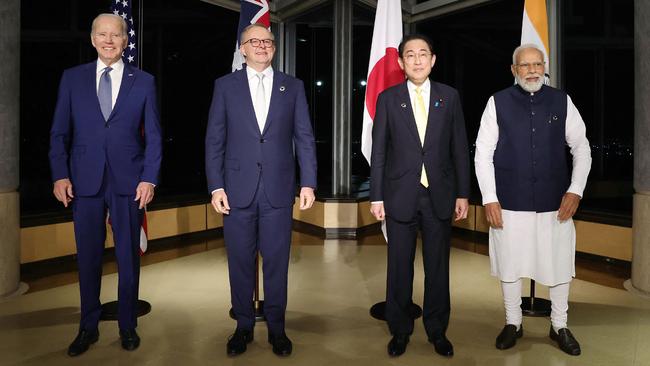Distracted Quad leaders must refocus on bullies in Beijing

It’s time to look back and around. The times are serious and strategic co-ordination is urgent.
Eighty years ago, Japanese diplomat Saburo Kurusu was the chief negotiator with the US in the run-up to the Pacific War of 1941-45. Regrettably, his efforts to prevent the war ended in failure. He wrote a memoir in which he reflected that the work of diplomats is like writing drawn in sand on the seashore. Once a war comes, they are quickly washed away.
But such words, such efforts can be erased by so minor a thing as the different work style of a diplomat’s successors. Rather than a sentimental thought on the fate of the letters I assiduously tried to engrave on Australia’s shores, what concerns me most now is languishing of the Quad – the strategic dialogue among Japan, Australia, the US and India.
Right after he became Prime Minister, in May 2022, Anthony Albanese flew to Tokyo to attend the Quad leaders meeting with Japan’s Fumio Kishida, America’s Joe Biden and India’s Narendra Modi. There, the new PM proudly proclaimed that although Australia’s government had changed, its commitment to the Quad had not and would not change.
Yet the main focus of his foreign and security policy has been relations with ASEAN and Pacific Island countries. We rarely hear the word “Quad” from either Albanese or his Foreign Minister, Penny Wong. Tangible progress has been so inadequate that the Japanese Foreign Ministry’s briefing material on its home page has not been updated since September 2023. This will gladden hearts in Xi Jinping’s Beijing.
International attention and resources have been redirected away from the Indo-Pacific, towards the wars in Ukraine and Gaza. Moreover, all four members of the Quad have become preoccupied with domestic politics. The US has entered a highly divisive election year. Australia’s political energies have been absorbed by the voice referendum, cost-of-living anxieties and renewed concerns about immigration and housing.
As the June election looms in India, debate centres on the Hindu-Muslim schism rather than the strategic India-China rivalry.
Japan’s domestic political situation could be described as even less outward-looking. The Kishida cabinet has been engulfed by successive political funding scandals, which have distracted him and his cabinet colleagues.
So, who is leading the Quad right now? An honest and correct answer would be nobody. This means there is a serious lack of quadrilateral consultation or co-ordination concerning the strategic challenges in the broad Indo-Pacific region – we are not consulting each other about China. In Australia, even while I was there, ASIO director-general Mike Burgess was told by some inside and outside the government to ease up on ASIO’s counterintelligence activities. I was told by several Australians in politics and government to seal my lips on the subject of China. Developments since my departure suggest Australia’s language regarding its own and our shared deteriorating security environment is narrowing.
The world’s eyes, a few short years ago, were focused on Australia, when it stood tall under tremendous diplomatic pressure and economic coercion by the Middle Kingdom. It is no exaggeration to say Australia gained a prominent international status through its resilience and principled approach. That is the Australia I admired and respected. The emphasis on “stabilising” relations with China is fine, but stabilisation should not mean staging photo opportunities or smiling and shaking hands with China’s Foreign Minister, Wang Yi, while guns are being pointed at your head – as they are in the South China Sea.
The strategic reality the Quad faces has not changed for the better. China has continued its decades-long massive military build-up irrespective of its ongoing economic slowdown. The People’s Liberation Army is already on Australia’s doorstep via security ties with a number of Pacific Island countries. Chinese forces continue to haze Taiwan and Japanese island territories, as well as Filipino islands and fishermen.
When US speaker Nancy Pelosi visited Taiwan, China launched five ballistic missiles into the exclusive economic zone of Japan. Why our zone? That was a first, and it was ominous. Meanwhile, border conflicts between China and India show no sign of abating.
In late 2022, Japan’s National Security Strategy Paper observed that China’s military build-up presents grave strategic challenges to Japan, to Australia and to all others who share basic values and strategic interests. Well-informed and strategically minded Australians fully understand this.
What, then, is to be done? The most fundamental requirement is collective security, which can most effectively be co-ordinated via the Quad. If we are to sustain a free and open Indo-Pacific, the Quad must be buttressed as a matter of urgent priority. Kishida’s upcoming visit to Washington DC is of critical importance. It is incumbent upon him to make a clear and powerful case for the Quad.
Australia’s role is vital. When America’s most intimate Indo-Pacific ally (Australia) and its important Indo-Pacific ally (Japan) speak from a common position, the Americans are inclined to listen. I am now a private citizen but, as a long-time servant of the Japanese state and a recent ambassador to Australia, I feel compelled to plead that this common position be adopted and pressed energetically upon Washington – and Delhi.
Shingo Yamagami was Japan’s ambassador plenipotentiary to Australia from 2021-23.


One year has already passed since I bid a fond farewell to my Australian friends and the wide brown country I had come to love, and within which I travelled widely during my time as ambassador.